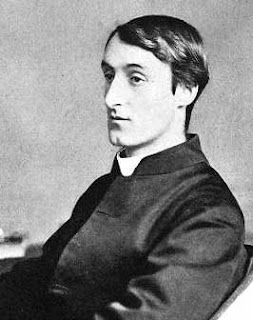Today in 1889 marks the death of the English Jesuit poet Gerard Manley Hopkins. The following is taken from The Hopkins Quarterly:
The major, the finest, poets of Victorian England were Alfred, Lord Tennyson, Robert Browning, Matthew Arnold, and Gerard Manley Hopkins. Yet Hopkins was almost unknown until 1918 when his book Poems was first published, as edited by his friend Robert Bridges, then Poet Laureate.
Born on 28 July 1844 in London suburb of Stratford, Essex, Gerard Hopkins grew up in the London’s Hampstead, among a comfortable family talented in word, art, and music. In 1863 he went up to Oxford where he did brilliantly and anguished over religion. With the counsel of John Henry Newman, he was received into the Roman Catholic Church on 21 October 1866, and after finishing Oxford in 1867 he taught for some months at Newman’s Oratory School near Birmingham.
Hopkins entered the Society of Jesus on 7 September 1868, and did his novitiate in London and his philosophy in Lancashire. After a year of teaching in the Jesuit Juniorate, he began theology at St. Beuno’s College in beautiful North Wales where, in the winter 1875-76, he flashed into poetic splendor with the long, great ode “The Wreck of the Deutschland.” His annus mirabilis as a poet was 1877, the year of his ordination, when he wrote eleven sonnets including “God’s Grandeur,” “The Starlight Night,” “As Kingfishers catch fire,” “Spring,” “The Windhover,” “Pied Beauty,” and “Hurrahing in Harvest.”
In October Hopkins left Wales, his “Mother of Muses,” to teach and minister variously in Derbyshire, London, Oxford, Bedford Leigh, Liverpool, Glasgow, and (after tertainship) Stonyhurst College. In these middle years Hopkins wrote fine prose sermons and such excellent poems as “Duns Scotus’s Oxford,” “Henry Purcell,” “Felix Randal,” and the poignant, wonderful “Spring and Fall.”
In 1884 Hopkins went to Dublin as Professor of Greek at University College and examiner in the Royal Univeristy. But on Stephen’s Green his chronic depression was magnified by bad eyesight, political irritation, spiritual desolation, and exhaustion from grading hundreds of examination papers. In 1885-86 he wrote seven sonnets, the “Terrible Sonnets” or “Dark Sonnets,” which scream with pain amid technical perfection. But other poems express patience, even jubiliant hope in Christ, though his final poem describes a “winter world ” in which his “sweet fire” of poetic inspiration has waned. A few weeks later, on 8 June 1889, he died, a victim of typhoid fever.
Hopkins’ poems, first published in 1918, grew into fame after the second edition of 1930. Hailed as experimental and strikingly modern, they display rich music, novel rhythms, clustered words, craggy strength, and poetic power. Later, Hopkins had distinguished followers: notably such important modern poets W.H.Auden, Robert Lowell, Sylvia Plath, David Jones, and Dylan Thomas.
Joseph J. Feeney, S.J












